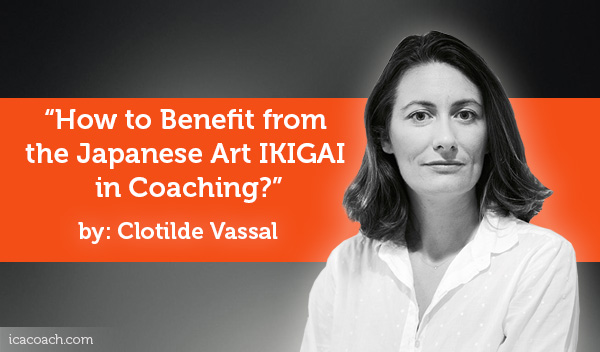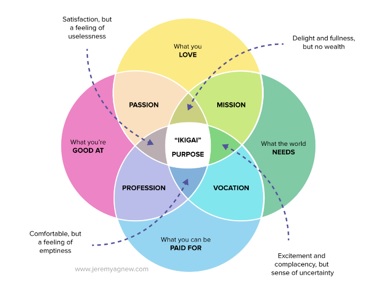
Research Paper By Clotilde Vassal
(Transition and Expat Coach, FRANCE)
Introduction
Living in Japan for more than 2 years, I am exposed to their zen culture and habits every day. That has aroused my curiosity and I try to understand where it was coming from.
Japanese culture is a mix of Buddhism and Shintoism. The Zen philosophy is about sophisticated simplicity – and attention to detail. The Shinto value is about being connected with nature. This is how Japanese are expert at bringing nature and technology together: it is a union of man and nature – not man versus nature.
What I discovered through their philosophy is the ability of Japanese people to take the body and mind to the next level, according to one’s ikigai.
Japanese people believe that everyone has an ikigai, which means a reason to get out of bed each morning.
Ikigai « the happiness of always being busy » explains the longevity of Japanese people especially the one living in Okinawa.
Who does not dream of having a happy and long life? This is the secret of Japanese ikigai!
Let’s have a look first at what ikigai is, how to find your own ikigai and what the benefits of having one are. And then we will see how to link ikigai to coaching.
What is ikigai?
Ikigai is a reason for being, what makes you get up in the morning. It is used to find the meaning of our lives and bring happiness.
Our ikigai is the reason we jump out of bed in the morning: with a strong and clear ikigai, we do what we love until our dying day.
It is the talent and passion we have that gives meaning to our days. And leads us to share the best of ourselves with the world.
Ikigai could be translated as Iki: Life + Gai: Worth: Life’s worth. That means it is the life purpose.
|
Ikigai has 4 directions: Mission Passion Profession Vocation |
And it is as well an action:
to serve to create to delight to nourish to provide to teach to heal to connect to build |
Ikigai helps people find their purpose in life. What is the purpose of my life?
Everyone has an ikigai – ‘raison d’être’, hidden deep inside each of us. To find it requires a patient search.
The search for meaning is to discover our life’s purpose; the path of finding our ikigai, our meaning of life. Once we find it, it is only a matter of having the courage and making the effort to stay committed to our mission.
A meaningful life can be enjoyed right now and any time we want to. A little bit of joy every day.
How to find our ikigai?
To find our ikigai, we can ask ourselves 4 questions :
Ikigai is at the intersection of these 4 questions where Mission, Passion, Profession and Vocation meet.

How finding our ikigai will change our life ~ how we will benefit from it?
Finding our ikigai can drive our daily life and make it happy – according to Hector Garcia and Fracesc Miralles :
Let’s have a closer look at these two other Japanese’s philosophies – as described by according to Hector Garcia and Fracesc Miralles:
Wabi-Sabi: It is the imperfection of nature. That shows us the beauty of the fleeting, changeable and imperfect nature of the world around us. Instead of searching for beauty in perfection, we should look for it in things that are flawed, incomplete. Only things that are imperfect, incomplete and ephemeral can truly be beautiful.
How to appreciate the beauty of imperfection as an opportunity for growth.
Ichi-Go Ichi-E: Living by being focused on the present and enjoying each moment that life brings us: this is why it is so important to find and pursue our ikigai.
The knowledge that this moment exists only now and won’t come again.
Life is pure imperfection, as the philosophy of wabi-wabi teaches us, and the passage of time shows us that everything is fleeting, but if you have a clear sense of your ikigai, each moment will hold so many possibilities that it will seem almost like an eternity.
To find this happiness in both mind and body is important: the health of one is connected to the health of the other. There is no magic recipe for finding that, for living according to our ikigai, but one key ingredient is the ability to reach this state of flow. Which means the creativity, pleasure, process and delight when we are completely immersed in our life.
Happiness is not in the result, it is in the doing. By being focused on enjoying your daily rituals we can use them as tools to enter a state of flow. It’s important to always have a meaningful challenge to overcome in order to maintain that flow.
Joy flows from people and guides them through the long and enjoyable journey of their lives. It also comes from feeling part of a community, having a high degree of emotional awareness and a positive attitude.
How to find this flow in everything we do: by having in mind that there is no future, no past. There is only the present – which is the Ichi-Go Ichi-E concept.
That will bring us a lot of advantages such as:
This flow is coming from our ikigai and it could also be a reverse process – use it to find our ikigai. What we like by spending more of our time in the activities that make us flow. Flow is mysterious. The more we train it, the more we will flow, and the closer we will be to your ikigai.
It is important to flow with our ikigai at all times by having a clear and concrete objective.
Mediation is a way of training our mind to get a place of flow more easily. Its goals are calming the mind and observing our thoughts and emotions by centring our focus on a single object.
How having found our ikigai will extend our longevity?
According to Hector Garcia and Francesc Miralles, the international superstar of longevity in Japan, which has the highest life expectancy of any country in the world. In addition to a healthy diet, longevity in Japan is closely tied to its culture: the sense of community and the fact that Japanese people make an effort to stay active until the very end, are key elements of their secret to long life.
What I learnt from the testimonies of people living in Okinawa knowing their ikigai and living life through it :
A healthy and purposeful life, these are the secrets of long life. Supercentenarian offers us inspiration and ideas for bringing energy and meaning to our lives.
With a clear purpose, no one can stop you.
To stay busy even when there’s no need to work, there has to be an ikigai on our horizon, a purpose that guides us throughout our life and pushes us to make things of beauty and utility for the community and our-self.
Celebrate each day, together, smiling and having a good time.
Always pursue your own ikigai but never in a rush.
We can summarize this Japanese life philosophy, ikigai and secret to longevity by :
How to integrate the search of ikigai in a coaching process?
The search for ikigai coud be compared to the search of the session goal. Gaining clarity on where we go with the client has the same power of living our lives knowing what is its purpose.
By exploring these four powerful questions, the goal of the session is defined :
Once the goal is clear, the session is built from there. There is a frame for exploration. The coach then checks the agreement and go on with the flow.
This flow of the coaching session could be compared to the daily life flow resulting from having found our ikigai.
Once the client has its ikigai on the mind, everything is built from there. That helps the client understand what is really important. That shows its values.
Using this ikigai in a coaching session is a driver of choice. Gaining focus and clarity in clients’ goals give a clear direction for their life. That helps them stay motivated and inspired.
Once the client finds his own ikigai, (s)he will find some goals which will drive his(er) action.
The coach will assist the client to achieve these goals which will match his ikigai. That will allow some changes in his behavior. With that, (s)he will move forward to a new level closer to his ikigai.
At the end of the coaching session, the client will have gained some clarity on his pathways, driven by his ikigai.
Assisting the client – by using some tools – to find his(er) ikigai will be a driver of transformational changes.
Expressing and showing the client what having this life purpose will bring to his(er) life. Power of changing and bring happiness.
Here is an exemple of tools which could be used in a session to assist and energize the client to find his(er) ikigai :
Once the goal or the ikigai is found it is time to identify the self-accountability structures.
Everyone with a clear ikigai brings meaning and joy to his(er) everyday life. They pursue their passion no matter what. They never give up: resilience!
Be focused on the important things in life – not on the urgent ones, and keep ourselves from being carried away by negative emotions.
Proper training for our mind, body and emotional resilience is essential for confronting life’s ups and downs. Like this Japanese proverb says: fall seven times, rise eight.
That means being flexible and adaptable to change and reversals of fortune by staying focused on our objectives. Better concentrate on things that we can control and don’t worry about those we can’t.
This is the art of living with ikigai: by being committed to our goals.
Summary
Once our ikigai is discovered, pursuing it and nurturing it every day will bring meaning to our life. Once our life has this purpose, we will achieve a happy state of flow in all we do.
Follow what we enjoy, and change or get away what we dislike. Be led by our curiosity, and keep busy by doing things that fill us with meaning and happiness.
Just remember to have something that keeps us busy, doing what we love while being surrounded by the people who love us.
I will conclude with these 10 rules of ikigai – as Hector Garcia and Francesc Miralles say :
- Stay active, don’t retire
- Take it slow
- Don’t fill your stomach
- Surround yourself with good friends
- Get in shape for your next birthday
- Smile
- Reconnect with nature
- Give thanks
- Live in the moment
- Follow your ikigai
There is a passion inside all of us, a unique talent that gives meaning to our days and drives us to share the best of ourselves until the very end.
Ikigai is the driver of moving forward.
The coach is devoted to keeping his(er) client motivated to move forward.
Resources
Hector Garcia and Francesc Miralles – Ikigai
Mark Winn Diagram
How to Ikigai | Tim Tamashiro | TEDxYYC